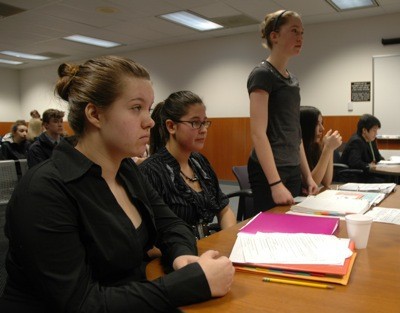MARYSVILLE — The attorneys and witnesses in Judge Fred Gillings’ courtroom at the Marysville Municipal Court on Jan. 27 conducted themselves so professionally that those who sat in the jury box for their trials commented upon how well they delivered their testimonies and presented their cases.
What made this especially notable was that none of the attorneys presenting their cases or the witnesses delivering their testimonies had not yet graduated from high school.
Two teams of eighth-grade students from the 10th Street School in Marysville competed against opposing teams of ninth-graders from Archbishop Murphy High School in a YMCA Youth and Government Mock Trial. The morning’s trial pitted student prosecutors from 10th Street against student defense attorneys from Archbishop Murphy, while the afternoon’s trial put 10th Street on the defense against Archbishop Murphy’s prosecution.
Each team of attorneys included its own complement of students witnesses, and all of the students had spent the past few months memorizing their scripts from the practice cases that they would be presenting before both Gillings and a panel of actual adult attorneys.
“It’s one thing when you have the same teachers preparing you with the same tactics,” said Alex Ratynski, a student prosecutor for 10th Street.
“Different schools have different points of view when they practice their cases, though, so it leads to different questions,” said Colin Pitner, a 10th Street witness.
“I wanted to get certain information out there, but Archbishop Murphy’s attorneys weren’t asking the questions that I needed to answer,” fellow 10th Street witness Jason Kent said.
Although 10th Street attorney Michael DuFour admitted to being nervous in front of the courtroom crowd, 10th Street witness Kendall McCoy was more nervous practicing in front of classmates than performing for “complete strangers.” Ratynski took his practice sessions so seriously that even his family took notice.
“My stepdad asked, ‘Why are you talking to yourself?'” Ratysnki laughed. “I told him, ‘Because I’m getting ready for mock trial,’ and he was like, ‘Oh, okay.'”
When it came to what they’d learned about the law itself, 10th Street attorney Kyle Coon noted that it had “lots of rules and exceptions,” while fellow 10th Street attorney Matt Bordonaro added that the experience had impressed upon him the degree to which the accused in a criminal case must be “proven guilty, without any doubt.”
10th Street teacher James Delazzari, who supervised the morning prosecution group, led them in a round self-evaluation and constructive criticism of their performances, including offering pointers on their opening statements.
“And did you get a sense of how legal documents are actually written?” Delazzari asked the students. “That’s why you need attorneys, because nobody knows all the laws, not even a judge. Attorneys’ arguments help guide those judgements.”
“Why don’t they have an odd number of jurors?” Pitner asked. “If they just wind up evenly split —”
“That’s why they have an even number of jurors, though,” Delazzari said with a smile. “Remind me to show you ’12 Angry Men’ sometime.”
After his mock trial was complete, Pitner expressed an interest in sitting in on a real trial.
After each mock trial concluded, Gillings praised the students for their poise and attention to detail.
“These were younger kids than normally compete in mock trials, but I was very impressed,” Gillings said. “It’s always welcome to see young people involved in positive things in the community, as opposed to the negative things that we often deal with in court. Additionally, their hypothetical cases were very topical and had a lot to do with current events.”
Marysville attorney and Arlington resident Larry Trivett echoed these assessments in his own remarks from the jury box.
“I was just blown away by how good they were, especially for their grade level,” Trivett said. “They were fantastically prepared and handled themselves well. They’d obviously gone over the material and were working hard to present their cases.”
Trivett believes this experience will give these young people an effective primer on the judicial system, something which he conceded many adult Americans could use.
“A lot of people don’t have a good understanding of how our system works,” Trivett said. “For those who are interested in entering the legal field, this gives them just a taste of how much work is involved. The schools did an excellent job of getting these kids ready. They did better in their roles than I’ve seen at some real-life court proceedings.”



